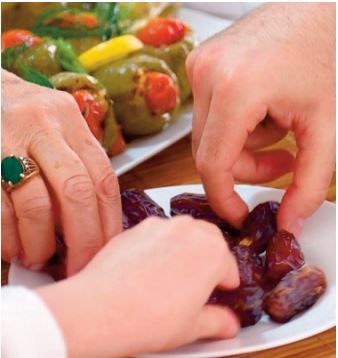
Muslims around the world will celebrate Ramadan this year during the spring season, which has shorter days compared to previous years and ideal temperatures.
To fully benefit from this experience of meditation and appeasement, people who celebrate Ramadan should be aware of the fact that abstinence allows the purification of the organism, stimulates the self-cleansing function of the organism through its cells (autophagy) and reduces premature aging of cells.
Fasting also makes it possible to prevent weight gain and some of the diseases associated with it: cardiovascular disease, diabetes, etc. Dr. Ikram Tikur, Nutritionist at MAP stated, adding that it also makes it possible to significantly reduce inflammation in the body and thus Cardiovascular diseases, cancers, infections and autoimmune diseases.
Dr. Tekur particularly emphasized the benefits associated with reducing insulin production, storing fat and sugar in the body, and stimulating the elimination of fat during abstinence.
“Fasting Ramadan has virtues. A good Ramadan is extraordinary for health,” said Dr. Reginald Alloush, a dietician and biomedical engineer, adding, “It helps to rest the organism. Abstaining from food during this month is a very beneficial thing. … The unhelpful thing is Eating a lot on the evenings of Ramadan.
Dr. Alloush, author of the book “The Liver Detox Method: Sustainable and Risk-Free Slimming Thanks to the Liver” (Albin Michel, 2019), emphasized that patients should compulsively ask their doctors whether or not to observe Ramadan.
In the same context, Dr. Takur added that there are no strict contraindications, but every person suffering from a disease no matter how trivial should not adhere to these rituals without medical advice and support, including children, the elderly, pregnant and lactating women.
In response to a question about the difference between intermittent fasting and Ramadan fasting, Dr. Takur indicated that during this blessed month, fasting is strict for a very specific period that an individual cannot adapt to his lifestyle. It is abstinence from breast-feeding during the day with strict restriction of food and drink. “For intermittent fasting, everyone can choose their own times and during this period, drinks are not prohibited,” she said.
She said that there are different ways to practice this intermittent fasting, the most famous of which are the 8:4, 16:8 and 2:10 pm abstinence in which a person fasts respectively at 8 pm, 4 pm or 2 pm.
Among Dr. Alloush’s recommendations for a good fasting day, it is necessary at breakfast (Shour, editor’s note) to add protein for satiety with nuts and fruits provided that you do not eat too salty foods.
On break, you have to take a soup and a date and hydrate yourself. Then a hot drink, following the traditional dish and raw vegetables to finish with fruits. One evening, every five days, we can have a cupcake. Friday for example, but not every evening.
By practicing intermittent fasting, “I was finally able to lose the fat that was around my stomach. I keep fit with minimal effort, without depriving myself,” asserts Ahmed who, for more than a year, no longer eats breakfast adding that he limits himself to one meal in Today.
For her part, Elham says that since the birth of her daughter, she began to worry about her appearance and wanted to regain her weight before pregnancy. “I was easily able to lose a few pounds but maintaining the same weight was difficult until the day I discovered intermittent fasting,” this young mother told MAP.
“I wake up very early in the morning without really wanting to eat. At around 1pm I have a light breakfast and I drink fluids until 7 or 8pm for a real meal,” she added, explaining that she practices this method twice a week. . “It’s a miracle, I was able to succeed in keeping fit. It is also necessary to exercise,” she affirmed.
“Naturally, we should not gain weight during Ramadan, and if we do it well, we can even lose it,” notes Dr. Alloush, a researcher in diabetes and weight gain prevention, adding that the holy month of Ramadan is unusual. for your health.”
“The Holy Ramadan relaxes the body, and helps rid the body of toxins because the liver will recycle itself,” he said, explaining that the liver needs, between midnight and four o’clock in the morning. He said that getting rid of fat and sugar and emptying them, and advised not to overeat in the evening and too late.
This month of abstinence annually gives, to those who observe it, the opportunity to take stock of food, but also to make a long-awaited lifestyle change! By Fadwa El Ghazi (Map)

“Hipster-friendly coffee fanatic. Subtly charming bacon advocate. Friend of animals everywhere.”





More Stories
Incidents in Colombia: Dozens of pro-Palestinian student demonstrators were arrested
Witnesses against Boeing: 'I'm here because I don't want to see a 787 or a 777 crash'
Two hours earlier, the 68-year-old died after his dead niece took him to the bank for a €3,000 loan.